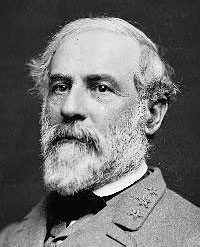Invading the North and Protecting the Capital

On June 5, 1862, as he settled into his new command of the Confederate army outside Richmond, Robert E. Lee contemplated his next moves. For starters, he put his men to the shovel building defensive fortifications—a course of action that earned him immediate derision from nearly everyone. Men began to call him “Granny Lee” and the King of Spades.” Undeterred, Lee urged them to keep working.
He also considered the other pieces available to him on the chessboard. In the Valley, Stonewall Jackson had not yet scored the twin victories at Cross Keys and Port Republic, but the series of wins he’d already notched had drawn considerable attention.
On that fifth day of June, Lee put some of his thoughts on paper for President Jefferson Davis. The dispatch, I think, offers some interesting insights about Lee:
After much reflection I think if it was possible to reinforce Jackson strongly, it would change the character of the war. This can only be done by the troops in Georgia, South Carolina & North Carolina. Jackson could in that event cross Maryland into Pennsylvania. It would call all the enemy from our Southern coast & liberate those states. If these states will give up their troops I think it can be done….
Our people are opposed to work. Our troops, officers, community & press. All ridicule & resist it. It is the very means by which McClellan has & is advancing. Why should we leave him the whole advantage of labor. Combined with valour, fortitude & boldness, of which we have our fair proportion, it should lead us to success. What carried the Roman soldiers into all countries, but this happy combination. The evidences of their labour last to this day. There is nothing so military as labour, & nothing so important to an army as to save the lives of its soldiers.
— Robert E. Lee, The Wartime Papers of Robert E. Lee, edited by Clifford Dowdey and Louis H. Manarin (New York: Da Capo, 1961), 183-184.
Excellent conversation starter.
One element of General Lee’s intentions is instructive: “[If it was] possible to reinforce Jackson strongly… it would call all the enemy from our southern coast & liberate those states.”
Federal forces were strong at Fort Pickens, Florida; the North had just engaged in a bloody contest against forts south of New Orleans, culminating in the capture of the Crescent City. Memphis would fall on June 6th …to the U.S. Navy. And this seems to be the flaw in Lee’s reasoning: launching an incursion into the North (possibly threatening the Capital) could result in land forces being moved North. But the U.S. Navy was not going anywhere. And with Naval support, even diminished Federal forces would continue to hold New Orleans, Memphis, Key West, St. Augustine, Fort Monroe, St. Louis, Hilton Head… And President Lincoln had already stripped McClellan of tens of thousands of troops (for defense of Washington D.C.) before McClellan departed for the Peninsula. So, where were these “Federal forces on Southern coasts” going to be redeployed from? What Southern states would be liberated?
At first glance it sounds like sound strategy, and it might have worked for a while with the skittish Lincoln administration. However, does this also show Lee’s lack of knowledge and understanding of the North’s capabilities? I agree that the North wouldn’t have given up what it already had, but it might have slowed things for a while. From other of Lee’s correspondence I think he underestimated the North.
These are the full spectrum insights of a strategist, operational commander, appreciative historian and ultimately one who fully appreciates the interwoven lines of War and Political Policy exposed by Clausewitz. In fact Lee more than any War time leader North of South understood that the successful alignment of political policy and wartime objectives were key to success. If anyone has evidence of Lee’s even knowing who Clausewitz was that would be appreciated.
It is doubtful that Lee could have been aware of Clausewitz as On War wasn’t translated to English until 1873.
What really struck me about this dispatch was his second paragraph and his contention that “Our people are opposed to work.”
I’m not sure he is saying that southerners were lazy or dependent upon slave labor. I think he is referring to the fact that soldiers, north and south, were completely unaware of the need for field works. Soldiers initially did not think making use of fortifications was manly and their use bordered on cowardice.
I agree with Charles, and here I think you see why Lee rated McClellan so highly. For all his deficiencies as a battle commander, Lil Mac had created a professional army, with a complete awareness of what was needed to conduct a proper approach and siege. Lee’s experience with the southern divas in Western Virginia and down the coast had brought him close to despair. He was very much aware of the vast northern superiority, which up to June, 1862 it been essentially allowed freedom to utilize. Lee’s strategic brilliance was in breaking Davis free from the failed strategic defensive.